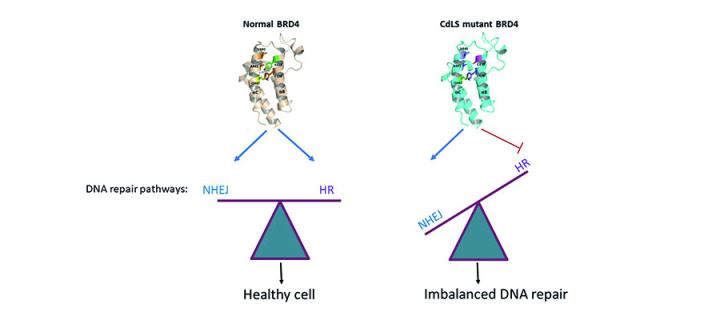DNA repair pathway implicated in Cornelia de Lange syndrome
Researchers at the MRC Human Genetics Unit found that a gene mutation associated with a CdLS like syndrome results in changes to DNA damage signalling and repair: May 2021

Cornelia de Lange syndrome (CdLS) is a genetic neurodevelopmental syndrome. Patients with CdLS may have a range of symptoms including intellectual disability, delayed growth and limb abnormalities. Mutations in several genes have been shown to lead to CdLS.
One of the genes associated with CdLS is called BRD4. The BRD4 protein binds to active regions of DNA and is known to influence gene expression. Therefore, scientists hypothesised that changes in genes under the control of BRD4 might lead to the clinical CdLS syndrome. However when Olley and colleagues studied embryonic stem cells carrying the CdLS BRD4 mutation they found surprisingly few changes in gene expression.
When they looked more closely they discovered that the BRD4 mutant cells grew more slowly and were slow to pass a particular ‘checkpoint’ in cell division. This could suggest that the BRD4 mutant cells have more DNA damage or have a stronger response to DNA damage. They therefore examined the rate of DNA repair and found that BRD4 mutant cells repair damage more slowly and that the balance between different ways of repairing DNA damage was altered in mutant cells.
The researchers also examined cells that had been derived from CdLS patients with mutations in a different gene (NIPBL). These cells also had more signs of DNA damage, suggesting altered DNA damage signalling or repair may be a common mechanism in CdLS.
This unexpected discovery of a problem with the repair of DNA damage, associated with a mutation in BRD4, suggests that we should consider whether altered DNA repair might contribute to some of the clinical symptoms found in other neurodevelopmental syndromes.
Links
- Bickmore Research group - https://www.ed.ac.uk/mrc-human-genetics-unit/research/bickmore-group
- Original article: https://doi.org/10.1038/s41467-021-23500-6

